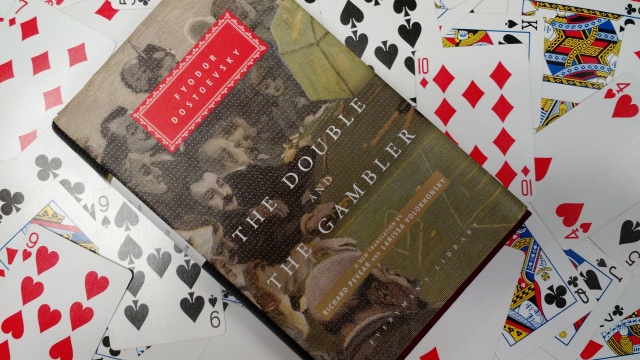
I have heard a ton of things about Dostoevsky but never had the chance to read him myself. Time has now come with one of his smaller works and a quite personal too. People have been telling me ‘Read it, you will like since you played cards, you will appreciate the atmosphere’. I did appreciate the atmosphere but no for this reason, not even close.
The book was about gambling in the roulette, a rather different setting than the cards in which there is variance in addition to mathematical strategy, namely game theory under incomplete information. This story was focusing on something else, it was concerned with passion, feelings, human psychology than probabilities and stochastic optimization.
I am new to Dostoevsky’s style of writing and it took a number of pages to get accustomed to 200 years back. There is the so-called transient phenomenon to overcome at the beginning. And to be honest I got addicted to the most recent writings of Orwell and Camus lately but hey – one ought not be monotonous. In this short review I will mention the aspects I liked, I didn’t like and I would like, without hopefully offending any hardcore fan.
What I liked. I liked the depiction of the central hero, Alexei, although I can’t say we have plenty of attributes in common. He was a modest teacher who fell in love with a step-daughter of a wealthier nonetheless declining family. He was bold, he had a character and he was willing to go to extremes to gain what he cherished. His addiction has actually double: of course he had a crippling relation with gambling but also his mentality toward Polina, the step-daughter, wasn’t the definition of healthy. Those two internal forces were competing each other and he got eventually torn apart (spoiler) without money or the girl. The tragic end, an end without redemption, comes as a warning-didactic message from the author who himself had certain issues with gambling. Do I feel some empathy about the hero in the end? I am not sure. At any rate, the final dialog between him and another main character, the equanimous and reserved Astley, who revealed the whole truth, has encapsulated probably the most dramatic instance of the novel.
What I didn’t like: the stereotypical traits of the nationalities involved were just that – stereotypical. The Germans were hard-working, meticulous and honest. The French were pompous and profligate. The Englishmen were calm, taciturn and diplomatic. The Poles were conniving and crooked. Finally, the Russians were passionate, daring nevertheless inadvertently self-catastrophic. It might be tempting to agree with that perspective because someone, somewhere, matches vaguely the description, however I cannot concur to such choice. It constitutes a platitude to defend a position against prejudice, therefore I am merely confined to a single observation you wouldn’t be exuberant had it been attached to you.
What I would like. I felt that the later part of the book was lacking the detailed approach of the earlier. I would definitely liked to know more about the demise of the protagonist. Thankfully, the Fall compensates for this exact purpose. The ending was a bit abrupt, harried. It would have made the last scene much more powerful should the author had elaborated further on the decadence of Alexei. In less than a few pages the description of his disintegrating transformation to a crumbling soul was simply not enough.
Overall, despite my seemingly not so venerating commentary, I appreciated the little book and I am determined to read more Dostoevsky. Perhaps he will be more thorough on the larger novels, or too exhaustive I will leave you with my favorite excerpt when Alexei, in a brief moment of clarity, is contemplating over his conflicting inner impulses:
“I swear I felt sorry for Polina, but strangely since the moment I touched the gaming table the night before and began to rake in wads of money, it was as if my love moved into the background. I say it now, but at the time I still hadn’t noted clearly. Can it be that I’m really a gambler, can it be that I indeed loved Polina so strangely?”
My grandma used to say ‘Whoever wins in gambling, loses in love’. Yet in a way we all gamble when we love. Nothing to win cher ami.
Α.Δ.

Also on Dostoyevsky:
and
LikeLiked by 2 people
Reblogged this on Manolis.
LikeLiked by 2 people
Despite the shortcomings, which you thoroughly outline, the synopsis of the plot makes me want to read it, probably because I have never touched another piece of fiction about gambling. I wholeheartedly suggest Crime and Punishment, if you are contemplating reading another work by Dostoevsky.
LikeLiked by 2 people
Was I that harsh? It’s a cute little novel. You can manage it it two afternoons. Crime and punishment you say? I was thinking about the Idiot first.
LikeLiked by 1 person